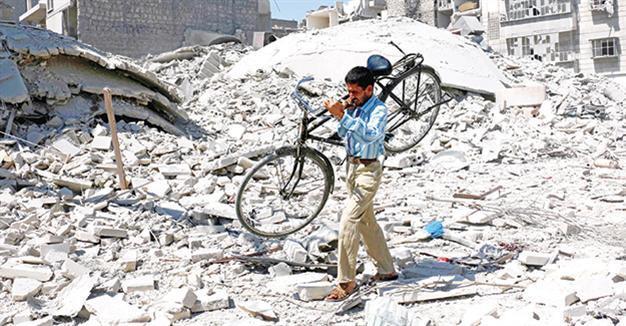All eyes on Syria truce as dozens killed in air strikes
ALEPPO/BEIRUT

AFP photo
Air strikes have killed dozens in rebel-held parts of Syria as all sides wait for a U.S.-Russia truce deal due to take effect on Sept. 12.
Brokered after marathon talks by the foreign ministers of Russia and the United States, the cease-fire has been billed as the best chance to end Syria’s five-year war.
Key regime ally Iran welcomed the plan on Sept. 11 and called for “comprehensive monitoring” of the truce, particularly along Syria’s volatile borders.
But even as world powers threw their weight behind the agreement, a barrage of unidentified raids left scores dead in opposition territory in two key northern cities on Sept. 10.
At least 62 people – including 13 women and 13 children – were killed in heavy bombardment on Idlib city, the Syrian Observatory for Human Rights said on Sept. 11.
The strikes hit several areas in the rebel-held city, including a market where shoppers were buying goods ahead of the first day of Muslim holiday of Eid al-Adha.
The U.K.’s special representative for Syria Gareth Bayley called the attacks “barbaric.”
“Bring on the #SyriaCeasefire,” he tweeted on Sept. 11.
Another 12 civilians were killed in unidentified strikes on several neighborhoods of Aleppo city, and 18 people died in bombardment of other parts of Aleppo province, the Observatory said.
“We hope there will be a ceasefire so that civilians can get a break. The shelling goes on night and day, there are targeted killings, besieged cities,” said Abu Abdullah, who lives in Aleppo’s rebel-held east. “Civilians have no hope anymore.”
State news agency SANA on Sept. 10 reported that Syrian President Bashar al-Assad’s government “approved the agreement”.
And Iran’s foreign ministry spokesman Bahram Ghasemi backed the deal on Sept. 11.
“The continuation and sustainability of a ceasefire relies on the creation of a comprehensive monitoring mechanism, in particular control of borders in order to stop the dispatch of fresh terrorists, as well as weapons and financial resources for the terrorists,” he said.
But Syria’s main opposition group the High Negotiations Committee -- which brings together political dissidents with armed rebel factions -- had yet to formally respond. Leading rebel figure Mohammad Alloush on Sept. 11 said the agreement was “still being studied.”
HNC member Bassma Kodmani told AFP on Sept. 10 that her group “cautiously welcomed” the deal but was skeptical that Damascus would comply.
The agreement was reached after marathon talks by U.S. Secretary of State John Kerry and Russian Foreign Minister Sergei Lavrov in Geneva.
It would see fighting and indiscriminate air attacks halt across the country starting at sundown on Sept. 12 for a period of 48 hours, which could then be renewed.
To get aid into the battered second city of Aleppo, a “demilitarized zone” would be established around the Castello Road into the city.
If the cease-fire holds for one week, the U.S. and Russia could start joint operations against jihadists from the Islamic State of Iraq and the Levant (ISIL) and al-Qaeda’s former Syrian affiliate.
On the ground, residents were split on whether a truce could hold, saying they were exhausted after several rounds of failed cease-fires, most recently in February.
“The Syrian people -- whether in areas controlled by the regime or the opposition -- have lost faith in both sides,” said Safwan Badawi in east Aleppo.
Abu Hasan, who works with a local civil society group, laughed off the ceasefire as “a joke.”
Pro-government Syrian newspaper Al-Watan’s front page yesterday said the deal would pave the way for renewed peace talks in Geneva “without pre-conditions or foreign interference.” “More importantly, Washington has finally agreed to joint military action” against jihadist groups, it wrote. Several attempts at peace negotiations have faltered since Syria’s war erupted, with talks earlier this year in Geneva fizzling out after the opposition walked away in protest at the humanitarian situation.
Student Abdulhadi Al-Omari said he believed “it is the beginning of the end of the crisis.”
“I am very optimistic because this truce is not like the previous one, it categorizes the opposition groups between terrorist and moderate,” he said.
